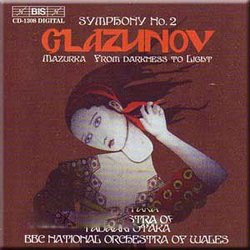| All Artists: Glazunov, Otaka, BBC Nat'l Orch of Wales Title: Symphony 2 Members Wishing: 0 Total Copies: 0 Label: Bis Release Date: 4/16/2002 Album Type: Import Genre: Classical Style: Symphonies Number of Discs: 1 SwapaCD Credits: 1 UPC: 675754502720 |
Search - Glazunov, Otaka, BBC Nat'l Orch of Wales :: Symphony 2
CD Details |
CD ReviewsGlazunov's slavonic sound world well portrayed by Otaka. David A. Hollingsworth | Washington, DC USA | 05/05/2002 (4 out of 5 stars) "Glazunov's Second Symphony is a rather strong and an assured work. Sometimes referred to as "civilized barbarism" for its bold and spontaneous gestures (and in many ways more daring than customery for this great, if not intriguing composer) this piece absorbs the Borodinian sense of heroics on a grand scale. Written in 1887, along with Stenka Razin and Suite Characteristique, the Symphony symbolized Glazunov's formitable period under a considerable influence of the Russian Five (most particularly of Borodin). The first movement begins with a theme announced by the brass tutti, which, while Russian in character, repeats itself throughout the first two movements. But the following exposition (in allegro) is dramatic and epic in nature. The second movement is rather mystic and in ways melancholic. Its seriousness and its tragic nature is carried onto and throughout the Scherzo third movement, which is among the strongest and direct of Glazunov's scherzi. The finale's optimism is notably attractive here, with some memorable ideas especially at the recapitulation. The movement is longwinded, but it nevertheless gives the piece a greater sense of unity and the closing is as genuine as might be expected. The Symphony is not a masterpiece, but strong and compelling enough that even Sir Arnold Bax transcribed the work for pianoforte. Upon closer examination, echoes of its magically slavic second movement are detectable in the slow movement of Rachmaninov's Second Piano Concerto.The two other works on this disc include the Mazurka in G major and the Orchestral Fantasy "From Darkness to Light." I really enjoy the Mazurka at every listening, for Glazunov's manipulation of ideas and his orchestration never flag. Chopin, among Glazunov's favorite composers, was an influence behind this work. But it's quite astonishing how skillfully Glazunov could give the piece its strong Russian fervor and color (as he did with Mazurka-Oberek for violin and orchestra written twenty-nine years later in 1917). The vivid, very Russified orchestration gives the work a much greater appeal. The Fantasy, though, is not among Glazunov's stronger works, but the narrative nature of the music holds up well enough.Tadaaki Otaka was well acclaimed for his Rachmaninov series under the now defunct Nimbus label, and with good reasons; He has this penchant for detail and dynamics that makes even a lesser work sound more worthwhile than it actually is. It is safe to say that he comes up huge in this CD, with the same BBC National Symphony Orchestra of Wales responding euphoniously to every measure, even with Otaka's tempo changes. What I admire about Otaka is his attention to detail while giving a given piece a sense of spontaniety without sounding ill-disciplined or indifferent. And I find myself in rapport with his tempi, though I think his approach of the Andante movement of the Symphony a shade too swift, especially at the beginning. The fire and enthusiasm are axiomatic in these works (marginally more so than Polyansky & the Russian State Orchestra under Chandos). Although the orchestra lacks the Russian zest and sonority of, say, the USSR Radio and Television Large Symphony Orchestra under Fedoseyev (VoxBox CDX 5118), the commitment and vividness it displays cannot at all be dismissed, even on merit. The recording, though, somewhat lacks bloom, with me reaching for the bass of my stereo only to discover that it's already up. So, while I'll place the Fedoseyev recording clearly on a pedestal, with Polyansky's Chandos recording relatively a close runner-up, Otaka's recording is truly worth checking out."
|

